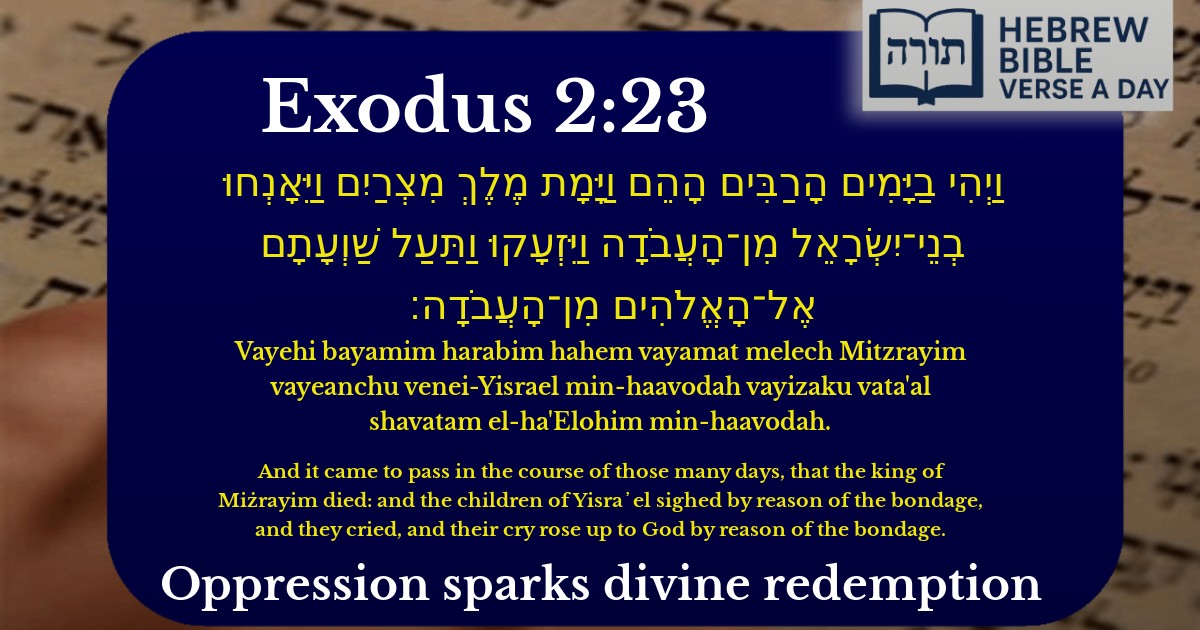Join Our Newsletter To Be Informed When New Videos Are Posted
Join the thousands of fellow Studends who rely on our videos to learn how to read the bible in Hebrew for free!
Hebrew Text
וַיְהִי בַיָּמִים הָרַבִּים הָהֵם וַיָּמָת מֶלֶךְ מִצְרַיִם וַיֵּאָנְחוּ בְנֵי־יִשְׂרָאֵל מִן־הָעֲבֹדָה וַיִּזְעָקוּ וַתַּעַל שַׁוְעָתָם אֶל־הָאֱלֹהִים מִן־הָעֲבֹדָה׃
English Translation
And it came to pass in the course of those many days, that the king of Miżrayim died: and the children of Yisra᾽el sighed by reason of the bondage, and they cried, and their cry rose up to God by reason of the bondage.
Transliteration
Vayehi bayamim harabim hahem vayamat melech Mitzrayim vayeanchu venei-Yisrael min-haavodah vayizaku vata'al shavatam el-ha'Elohim min-haavodah.
Hebrew Leining Text
וַיְהִי֩ בַיָּמִ֨ים הָֽרַבִּ֜ים הָהֵ֗ם וַיָּ֙מׇת֙ מֶ֣לֶךְ מִצְרַ֔יִם וַיֵּאָנְח֧וּ בְנֵֽי־יִשְׂרָאֵ֛ל מִן־הָעֲבֹדָ֖ה וַיִּזְעָ֑קוּ וַתַּ֧עַל שַׁוְעָתָ֛ם אֶל־הָאֱלֹהִ֖ים מִן־הָעֲבֹדָֽה׃
וַיְהִי֩ בַיָּמִ֨ים הָֽרַבִּ֜ים הָהֵ֗ם וַיָּ֙מׇת֙ מֶ֣לֶךְ מִצְרַ֔יִם וַיֵּאָנְח֧וּ בְנֵֽי־יִשְׂרָאֵ֛ל מִן־הָעֲבֹדָ֖ה וַיִּזְעָ֑קוּ וַתַּ֧עַל שַׁוְעָתָ֛ם אֶל־הָאֱלֹהִ֖ים מִן־הָעֲבֹדָֽה׃
🎵 Listen to leining
Parasha Commentary
📚 Talmud Citations
This verse is quoted in the Talmud.
📖 Sotah 11a
The verse is cited in the context of discussing the suffering of the Israelites in Egypt and how their cries reached God, leading to their eventual redemption.


Context of the Verse
The verse (Shemot 2:23) marks a pivotal moment in the narrative of the Jewish people's enslavement in Mitzrayim (Egypt). It describes the transition from silent suffering to active outcry, which ultimately leads to Hashem's intervention and the beginning of the redemption process.
Rashi's Explanation
Rashi (Rabbi Shlomo Yitzchaki) comments on the phrase "וַיֵּאָנְחוּ בְנֵי־יִשְׂרָאֵל" ("the children of Israel sighed"):
Rambam's Perspective
Rambam (Maimonides) in Hilchot Ta'anit (Laws of Fasting) teaches that communal suffering should lead to introspection and prayer. This verse exemplifies that principle:
Midrashic Insights
The Midrash Rabbah (Shemot Rabbah 1:34) elaborates on the phrase "וַתַּעַל שַׁוְעָתָם אֶל־הָאֱלֹהִים" ("their cry rose up to God"):
Talmudic Interpretation
The Talmud (Sotah 11a) discusses the significance of the king's death:
Spiritual Lessons
This verse teaches several key principles in Jewish thought: